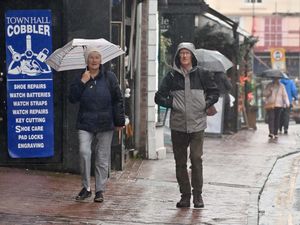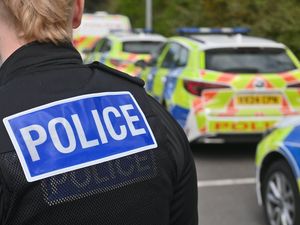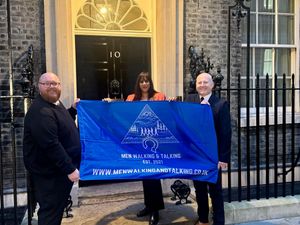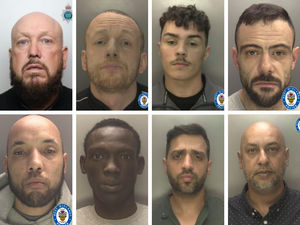The empty city centre shops serving as daily reminder of Wolverhampton's decline
Among the boarded up businesses in Broad Street there’s one that features a hoarding proclaiming, “moving to a sweeter destination”.
It could relate to dozens of the shops in Wolverhampton city centre that in recent years have either moved to pastures new or closed down for good.
The once thriving shopping destination, home of Beatties, Owen Owen, Sundown Records and Fenwick’s, is now a shadow of its former self. A stroll along its streets makes for a depressing sight. Everywhere you look the shutters are down and the ‘To Let’ signs are up.
The Hooded Ram, which occupied the former NatWest Bank building on the corner of Lichfield Street, closed its doors in 2021 and has remained vacant ever since.
Next door is the former Coral bookmakers, also now boarded up, while opposite the old Epic Cafe, which was previously Bookland, is empty and available to let for £20,000-a-year.
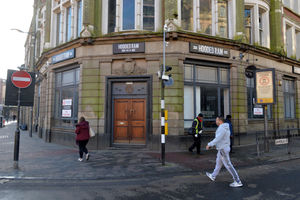
Around the corner on Princess Street it’s a similar tale of woe.
The building that used to house the Revolution Bar, which shut down in 2013, had been lined up for a restaurant and apartments but no work has yet taken place.
Look across the street and the old RBS building has been empty for years, a ‘To Let’ sign displayed on its front clearly more in hope than expectation. Anyone wanting to take it on can do so for a rent of £25,000-a-year, plus rates.
Further along the street lies the old E. Marsh Upholsterers site, empty since the famous old firm left in 2015 after more than a century of trade – with bosses blaming long-running roadworks for forcing them out. Wolverhampton Homes on the corner of Market Street is another empty shell.
A few hundred yards away and the tragic sight of the old Beatties lurches into view, its doorways now occupied by the homeless, its windows bearing adverts encouraging people to invest in Wolverhampton.
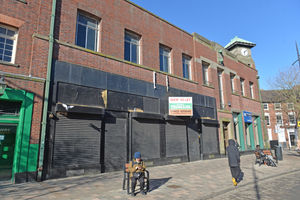
READ MORE
The building opposite has been empty since October 2019 when KFC pulled out, and the Subway next door has also gone.
Along Victoria Street at least six stores have closed down since pedestrianisation works started there more than a year ago, including Toni & Guy and MRG, while Le Monde, which has been there for nearly 30 years, is having a closing down sale.
It goes on. And on. And on. When even the bookies and pawnbrokers are closing down, you know you’re in trouble.
Wolverhampton is certainly not alone in its struggles. Many – although not all – towns and cities across the country have seen footfall drop significantly due to the continued rise in online shopping. The situation has only been exacerbated by the pandemic.
But the truth is the city has been on a downward spiral for the best part of two decades. It is a situation that Henry Carver, boss at Carver’s Building Supplies, is hoping to play a part in addressing.
He is shelling out £30,000 to fund an independent review, which he hopes will come up with some fresh ideas to revitalise the city.
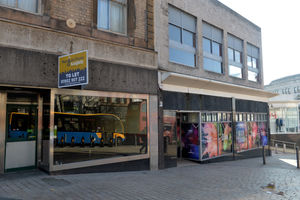
For some, the finger of blame over the city’s plight points squarely at Wolverhampton Council, with the Labour-run authority under the microscope over a series of regeneration schemes that appear to have done more harm than good.
They include the Victoria Street pedestrianisation works, which have dragged on for more than a year and have had a disastrous impact on traders.
Gavin Thomas, who ran Toni and Guy, said the council had ignored his pleas for support when revenue was cut in half by the roadworks.
“I really don’t know what their mindset is,” Mr Thomas said. “They are spending money to make Victoria Street attractive and one of the most attractive businesses in that street they’ve let go of.
“You would think a city centre would want to have a business like Toni and Guy.”
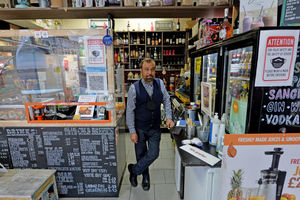
Sham Sharma, chair of Wolverhampton Business Forum, closed down his Zuri Coffee shop on Lichfield Street due to falling trade.
He said the council had “killed off the city centre” and had no interest in listening to businesses – a point he says was proved when no council representative turned up to a recent meeting of more than 100 concerned traders.
“They have proved time and time again they are incapable when it comes to commercial activities,” he said. “So many good businesses have been lost due to years of neglect and people no longer want to come here to shop.There’s more activity in a morgue than there is in Wolverhampton city centre.”
Mr Sharma said many stores had been unoccupied for “years on end” due largely to “prohibitive” rent and rates. He said he was quoted £40,000 for rent and rates at one small empty store in the city centre.
“On top of that I’d have staff wages, electricity, gas and insurance. You need to bring in £2,000 profit a week to make it worthwhile, which in a city with such low footfall is impossible.”
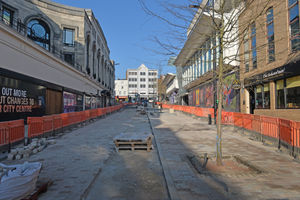
Mr Sharma said the forum wanted the council to look at “innovative” ways to revitalise the city centre, with a focus on creating high quality “city living” above shops, bars and restaurants to create a “ready-made” customer base.
“They really need to urgently start looking at ways to bring empty shops back into use,” he said. “I would give landlords incentives to renovate empty shops and turn them into high quality apartments.
"You would create a customer base and that would give businesses a reason to start opening up. Once that happens you get others piggy-backing on and you start to have a proper city centre again that people want to come to.”
Councillor Wendy Thompson, leader of the opposition Conservative group on the council, said there were a number of ways to increase footfall in the city centre. They include bringing in free parking and improving bus routes to increase access. She also suggested working with landlords to bring empty plots back into use, and making use of compulsory purchase order powers.
“We have buildings like Beatties – which has sadly become a blight on the city – and the old post office which must be prioritised,” she said.
“At the moment there is no reason for people to come into the city because it has fallen so far behind places like Telford.
“There needs to be a more dynamic approach.”

Councillor Stephen Simkins, Wolverhampton Council's deputy leader and economy chief, says a "blended approach" – centring around events and attractions as well as retail – will see the city centre "buzzing again".
It is no secret the high street landscape has dramatically changed with retailers struggling up and down the country – not just in Wolverhampton.
Our recently updated Wolverhampton Investment Prospectus presents an ambitious plan and vision of how the city can grow. It builds on investment already made by the Council in works to improve the city centre’s attractiveness and provide spaces people will enjoy; the development of the Commercial District around the Interchange, which is delivering jobs and has attracted the first Government department headquarters outside of London; and securing brownfield land for city centre living schemes like Canalside South where Legal & General Modular Homes will be developing 400 homes.
To deliver the transformation necessary after years of under-investment and the impact of the pandemic and a struggling economy, we need assurance of funding. Given that we are a Government Levelling Up priority city, it is therefore hugely disappointing that funding for our plans for investment in green growth and jobs was recently rejected.
Studies show that cities that have seen an increase in footfall post pandemic have done so by diversifying – adding to their retail offer with events and attractions, and by improving public spaces to create the infrastructure for these activities, as well as enhanced walking, cycling and dwell space.
It is this blended approach to investing in our city centre, new entertainment venues like Box Space and The Halls Wolverhampton – being run by world-class operator AEG Presents, on top of our cultural gems like the Grand Theatre and Art Gallery, and the new Council-led City Learning Quarter drawing in students of all ages, that will increase footfall by hundreds of thousands of people each year and boost the local economy by millions of pounds annually – prompting the private sector growth and investment necessary to bring empty premises back into use.
Footfall will be further boosted by the number of exciting new city centre living developments in Wolverhampton which are bringing former disused buildings back into use, including schemes at various stages like Crown House, Network House, Bond House, Gresham Chambers, Eagle Works, Beatties and Sunbeam Factory.
Overall, we understand the significant challenges businesses are facing across the UK due to the pandemic, Brexit and energy costs. These matters are beyond our control. But we regularly meet with city businesses and we are working closely with them to provide support where we can. Recently, the British Business Bank named Wolverhampton as the top local authority in the West Midlands for its Start-Up Business Loans programme. We are always keen to hear the views of our businesses to help shape our plans, which we believe will get our city centre buzzing again.

